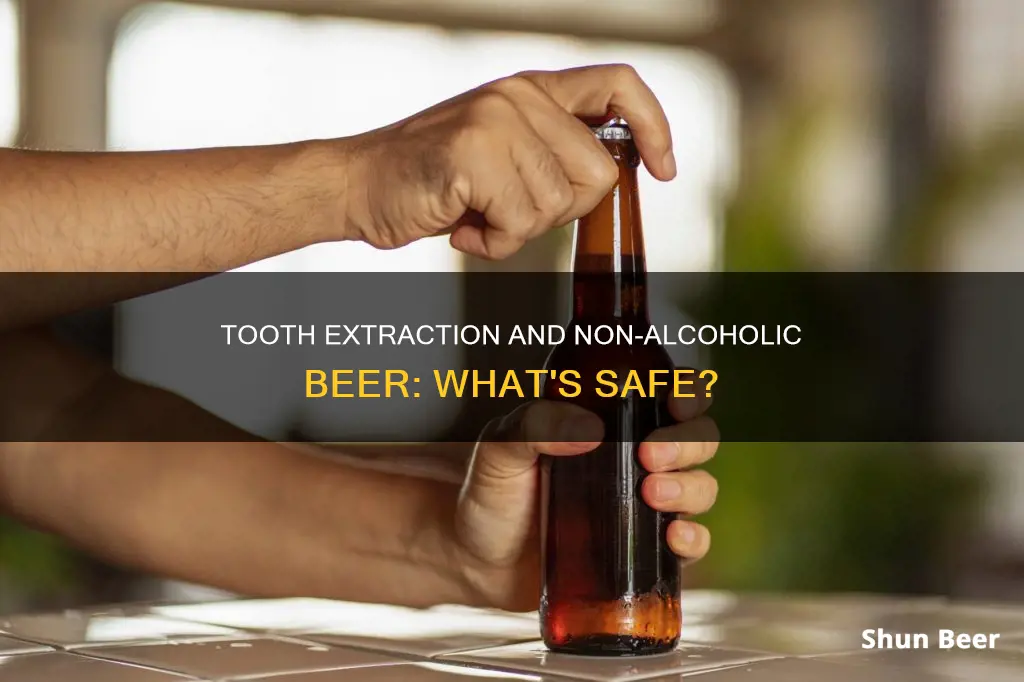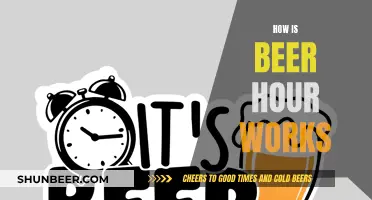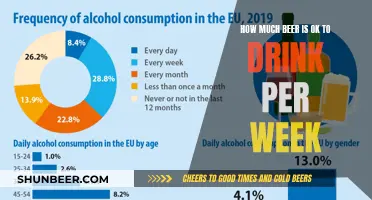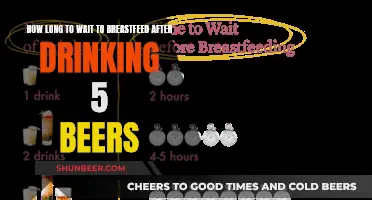
Drinking alcohol after a tooth extraction is not recommended as it can hinder your recovery and cause health issues such as pain, infection, and dry socket. This is because alcohol thins the blood, which can cause excess bleeding and prevent blood clotting. It can also lead to dehydration, which is crucial to the healing process. It is also dangerous to mix alcohol with painkillers, which are commonly prescribed after tooth extraction. Therefore, it is generally advised to wait at least 72 hours, or even 7-10 days, before consuming alcohol after a tooth extraction.
What You'll Learn
- Alcohol thins the blood, which can cause more bleeding and hinder blood clot formation
- Drinking non-alcoholic beer may be okay after 24 hours, but it's best to wait 7-10 days
- Staying hydrated is crucial for healing, so drink water instead
- Drinking alcohol while taking pain medication can be dangerous and cause adverse effects
- Other steps to aid recovery include resting, eating soft foods, and avoiding smoking

Alcohol thins the blood, which can cause more bleeding and hinder blood clot formation
Drinking non-alcoholic beer after a tooth extraction is generally safer than drinking regular beer, as alcohol can hinder the healing process. Alcohol thins the blood, which can cause more bleeding and hinder blood clot formation.
After a tooth extraction, a blood clot must form in the extraction area to protect the underlying bone and nerves and promote healing. This process can take a week or more. Alcohol consumption can slow down or prevent blood clot formation, leading to a prolonged recovery process.
Alcohol can also cause dehydration, which can dry out the blood clot and make it more likely to dislodge. A dislodged blood clot can result in a condition called dry socket, which is extremely painful and can lead to infection.
To promote healing and reduce the risk of complications, it is recommended to avoid alcohol for at least 72 hours after a tooth extraction, with some sources suggesting a longer period of abstinence of 7 to 10 days. Staying hydrated by drinking water is crucial during the healing process.
In addition to its effects on blood clot formation, alcohol can also interact with pain medications commonly taken after a tooth extraction, increasing the risk of negative side effects and adverse interactions. It is generally advisable to wait until you no longer require pain medication before resuming alcohol consumption.
How Much Is Too Much? Drinking 12 oz Beer
You may want to see also

Drinking non-alcoholic beer may be okay after 24 hours, but it's best to wait 7-10 days
Drinking non-alcoholic beer after a tooth extraction is a better option than drinking regular beer, but it may still be best to wait a while before consuming any. While non-alcoholic beer won't have the same blood-thinning effects as regular beer, it is still important to give your mouth time to heal after a tooth extraction.
After a tooth extraction, a blood clot needs to form in the socket to protect the nerves and bone underneath and promote healing. This process can take about a week, and drinking anything besides water or tea could disrupt it. Drinking non-alcoholic beer within the first 24 hours after your tooth extraction could interfere with this process, leading to a condition called dry socket, which can be very painful and prolong the healing process.
It's best to follow your dentist's advice on how long to wait before drinking non-alcoholic beer. While some sources suggest waiting at least 24 hours, others recommend waiting a full week to ensure the blood clot has formed and is helping your gum to heal. Most dentists recommend avoiding alcoholic drinks for at least 72 hours, but it's ideal to wait 7 to 10 days to give your mouth the best chance to heal.
In the meantime, it's important to stay hydrated, so be sure to drink plenty of water. You can also promote healing by getting plenty of rest, eating soft foods, and avoiding smoking or using straws for at least the first 24 hours after your procedure.
How Long Does Beer Last After Opening?
You may want to see also

Staying hydrated is crucial for healing, so drink water instead
After a tooth extraction, it's important to focus on staying hydrated by drinking water instead of non-alcoholic beer or other alcoholic drinks. Here's why:
Tooth extractions can be unpleasant, and you may experience some swelling and bruising around your face where the tooth was removed. It's crucial to follow your dentist's aftercare instructions to facilitate healing and prevent complications. Staying hydrated is an essential part of the recovery process.
When a tooth is extracted, a blood clot must form in the empty socket to protect the underlying bone and nerves and promote healing. This process can take a week or more. Drinking alcohol during this time can hinder the formation of the blood clot. Alcohol thins the blood, potentially making you bleed more and preventing your blood cells from bonding and clotting. If the blood clot doesn't form properly or becomes dislodged, you can develop a condition called "dry socket," which is extremely painful and can lead to infection.
In addition to hindering blood clot formation, alcohol consumption can also cause dehydration, further impeding the healing process. Water, on the other hand, helps to keep you hydrated, which is crucial for optimal recovery.
It's also important to consider the medications you may be taking for pain relief after the extraction. Mixing certain pain medications, both prescription and over-the-counter, with alcohol can be dangerous and lead to adverse effects. It's generally recommended to wait until you no longer need pain medication before resuming alcohol consumption.
While it may be tempting to reach for a non-alcoholic beer or other alcoholic beverage after your tooth extraction, it's best to stick with water to support the healing process and avoid potential complications.
Beer and Aleve: Safe Mix or Health Risk?
You may want to see also

Drinking alcohol while taking pain medication can be dangerous and cause adverse effects
It's understandable if you want to celebrate undergoing your procedure with a drink, but it is not recommended to drink alcohol after a tooth extraction. This is because drinking alcohol can hinder your recovery and create problems for your health, including pain, infection, and dry socket.
After a tooth extraction, a blood clot must form in the extraction area until granulation tissue forms. This can take a week or more. Alcohol thins your blood and can prevent your blood cells from bonding and forming a clot. If the blood clot doesn't form or becomes dislodged, you could develop dry socket, a condition that causes extreme pain and slows down your recovery process.
Another issue with drinking alcohol after a tooth extraction is the combination of medication and alcohol. It is common for dentists to either prescribe painkillers or recommend over-the-counter pain medications to provide comfort and relief from pain after surgery. Mixing those medications with alcohol can be dangerous and have serious effects on your body, including liver failure, impaired motor function, and dizziness.
Combining alcohol with certain medications can lead to severe health problems and even be lethal. Alcohol can enhance the effects of prescription opioid painkillers, causing a more intense high but also making you extremely drowsy. As a result, your breathing and heart rates slow down, your oxygen levels plummet, and your risk of slipping into a coma increases.
To avoid the dangerous side effects of mixing alcohol with pain medication, it is best to abstain from drinking alcohol whenever you are taking pain medication, no matter how small the dosage. Even a single social drink could put your health at risk. Consult with your doctor or pharmacist for more specific instructions on alcohol consumption and medication management.
Drinking Beer at the Airport: Lobby Laws and Limits
You may want to see also

Other steps to aid recovery include resting, eating soft foods, and avoiding smoking
After a tooth extraction, it's important to follow your dentist's advice and take good care of your body to aid the healing process. Here are some essential steps to follow for a smooth and quick recovery:
Get ample rest
Allow your body to rest and recuperate. It is recommended to rest for at least 24 hours after the extraction. Avoid strenuous activities for the first few days to give your body time to heal.
Eat soft foods
Stick to a soft food diet for at least 3 days after the procedure. Avoid hard, crunchy, or sticky foods that can irritate the extraction site or dislodge the blood clot. Soft, nutritious foods will promote healing and ensure a smooth recovery.
Stay hydrated
Drink plenty of water to stay hydrated. Water helps with the healing process and promotes faster recovery. Avoid alcoholic and carbonated beverages, as well as very hot or cold drinks, as they can irritate the extraction site and hinder blood clot formation.
Avoid smoking
Refrain from smoking or using tobacco products for at least 3 days following the procedure. Smoking can delay healing and increase the risk of complications. It is best to avoid any activities that can create suction or pressure in the mouth, as they can also affect the blood clot.
Beer and Braces: Ceramic Care and Drinking
You may want to see also
Frequently asked questions
It is not recommended to drink non-alcoholic beer after a tooth extraction as it can hinder the recovery process. It is best to wait for at least 72 hours or even up to 7-10 days to allow the wound to heal.
Drinking non-alcoholic beer after a tooth extraction can interfere with the formation of a blood clot in the extraction area, which is necessary for healing. It can also dehydrate you, which is not ideal for recovery.
Drinking non-alcoholic beer after a tooth extraction can increase the risk of developing "dry socket", a painful condition that slows down the healing process and may require additional dental visits.
It is recommended to wait at least 72 hours, but ideally 7-10 days, to allow the wound to heal and the blood clot to form completely.
It is recommended to drink plenty of water to stay hydrated and promote faster healing. Lukewarm tea is also a good alternative.







